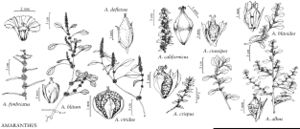Amaranthus fimbriatus
in W. H. Brewer et al., Bot. California 2: 42. 1880.
Plants glabrous. Stems erect or with lateral branches ascending, usually branched from base, main and lateral stems sparingly branched or simple, 0.3–0.7(–1) m. Leaves short-petiolate; petiole 1/4–1/2 as long as blade; blade linear to narrowly lanceolate, (1–)2–6(–10) × 0.1–0.5(–1) cm, base narrowly cuneate, margins entire, plane, apex acute to mucronulate. Inflorescences mostly axillary clusters scattered from base to apex of plants, distally condensed in lax, unbranched, almost leafless, slender, terminal spikes, interrupted. Bracts of pistillate flowers ovate to ovate-lanceolate, 1–1.8 mm, shorter than tepals, about 1/2 or less as long as tepals. Pistillate flowers: tepals 5, reflexed, fan-shaped to broadly spatulate, clawed, equal or subequal, 1.5–3.3 mm, margins fimbriate or denticulate, apex much expanded and obtuse; style branches erect to ± spreading; stigmas 3(–4). Staminate flowers: tepals 5, apex obtuse; stamens (2–)3. Utricles subglobose to obovate, 1.2–2 mm, shorter than tepals, rugose to nearly smooth, dehiscence regularly circumscissile. Seeds black or dark reddish brown, lenticular to broadly lenticular, 0.8–1 mm diam., shiny, smooth. 2n = 34.
Phenology: Flowering summer–fall (in arid regions mostly after summer rains).
Habitat: Sandy, gravelly slopes, washes, semideserts, disturbed habitats
Elevation: 500-1700 m
Distribution
Ariz., Calif., N.Mex., Tex., Utah, n Mexico.
Discussion
Two varieties of Amaranthus fimbriatus have been recognized: var. fimbriatus, with tepals fimbriate at the apex, and var. denticulatus (= A. venulosus S. Watson), with denticulate or crenulate tepals. The latter is reported from Arizona and adjacent northern Mexico; it probably occurs more widely.
A related species, Amaranthus chihuahuensis S. Watson, which occurs in Mexico (Chihuahua and Oaxaca), was reported from trans-Pecos Texas, but no reliable specimens were seen by C. F. Reed (1969b). The presence of that species in the United States needs confirmation, and its taxonomic identity remains obscure.
Selected References
None.
